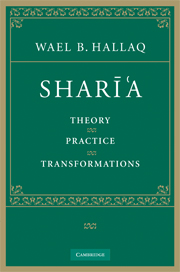Book contents
- Frontmatter
- Contents
- Preface and acknowledgments
- Introduction
- Part I The pre-modern tradition
- Part II The law: an outline
- 6 The legal pillars of religion
- 7 Contracts and other obligations
- 8 Family law and succession
- 9 Property and ownership
- 10 Offenses
- 11 Jihād
- 12 Courts of justice, suits and evidence
- Part III The sweep of modernity
- Appendix A Contents of substantive legal works
- Appendix B Chronology
- Bibliography
- Index
6 - The legal pillars of religion
Published online by Cambridge University Press: 05 June 2012
- Frontmatter
- Contents
- Preface and acknowledgments
- Introduction
- Part I The pre-modern tradition
- Part II The law: an outline
- 6 The legal pillars of religion
- 7 Contracts and other obligations
- 8 Family law and succession
- 9 Property and ownership
- 10 Offenses
- 11 Jihād
- 12 Courts of justice, suits and evidence
- Part III The sweep of modernity
- Appendix A Contents of substantive legal works
- Appendix B Chronology
- Bibliography
- Index
Summary
Introduction
Islam, according to one important Prophetic tradition, “was built upon five [foundations]: [a] the double-testimony that there is no god but God and that Muhammad is the Messenger of God (shahādatayn); [b] performance of the prayer (ṣalāt); [c] payment of alms-tax (zakāt); [d] performance of pilgrimage (ḥajj); and [e] fasting (ṣawm) during the month of Ramadan.” Apart from the first, a foundational theological pronouncement of faith accompanied by neither substantive nor procedural rules, the rest occupy a prominent place in the legal literature, having for the entire history of Islam been regarded as the bedrock of religion and religious practice, melding the theological with the legal. It is not without good reason that they, together with purification (ṭahāra) – a preface to prayer – have come to constitute the opening chapters of legal works, occupying as much as one-quarter to one-third of the entire body of these works (see Appendix A).
These performative works are constructionist, in that they are constituted and created by the believers as devotional acts for the purpose of fulfilling a covenant with God. In this sense they stand apart from the rest of the law, where acts relate to worldly objects and persons, to Muslims and non-Muslims, where the intention and raison d'être is to acquire or sell property, marry, divorce, free slaves, sue for damages, etc.
- Type
- Chapter
- Information
- Sharī'aTheory, Practice, Transformations, pp. 225 - 238Publisher: Cambridge University PressPrint publication year: 2009



